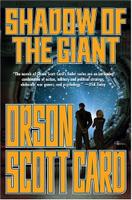The latest (and last?) book in the second series set in the world we first met through Ender's Game. When described like that, it sounds complicated and maybe even that the author is trying to make more money out of material he's already used. But, in actuality, this is a good book, and the Ender's Shadow series is quite interesting-- we get to know the children from Battle School more as they grow up, we get to see some of the process of Earth becoming unified under the Hegemon (something that is only glimpsed briefly at the end of Ender's Game), and we get to see a bit more of the fascinating personage of that shadow-caster himself, Bean.
As in Shadow of the Hegemon, in places reading this book feels almost like watching a full-scale game of Risk or Diplomacy-- only with all the details and idiosyncrasies of the particular strengths certain countries and communities bring to any fight. This is not a bad thing; it's actually quite fascinating, to watch the battles and politics unfold, and both the military and political strategies are quite convincing-- with now and then a nod to familiar Earth history, both military and political.
It's been quite a while since I read Shadow Puppets (the book immediately before this one in the Bean series), and a much longer time since I last read Ender's Game, so it's hard for me to remember the characters from Battle School, and what they were like as children there. I felt like I didn't quite recognize them, like there might be slight discontinuities in their personalities-- but feel unfit to judge that, since I can't remember so well. When the kids are all at Battle School, their different nationalities are just one aspect among other particularities to make each of them unique-- but here, the nationality of the members of Ender's "jeesh" comes into prominence, as many of them are thrust into leadership roles and empire-building within their home country.
One of the major components of this book is Peter's attempt to build a one-world government, what he calls the "Free People of Earth", or FPE. His vision is that all nations (and also people-groups not currently recognized as nations) would be similar to what states are now in the U.S.-- each would retain its own autonomy, to some degree, and would still be individual and unique, but would also be part of the larger whole. To some extent, the portrayal of this is quite believable-- it makes perfect sense that the smaller and more oppressed nations (and those not recognized as nations) would be most willing to join the FPE. However, it is a little more difficult to swallow the idea that war-mongering empire-building nations would simply give in and join up when their leadership changes up a bit, or after a few military set-backs. And once all the nations join up, who is to say that no one would later rebel or try to take over the government? Or that the government would not become corrupt? It's a nice idea, but I find it hard to completely buy into.
As a side-note, I find it both interesting and slightly disturbing the way the U.S. is portrayed (as I imagine Card intended). At this point in time, the U.S. has basically withdrawn from the rest of the world-- the borders are closed, and the U.S. no longer takes any interest in what is going on elsewhere (having given up on attempting to be the world police, as had been attempted in prior centuries). At the end of the book, the U.S. is the only country who has not yet joined the FPE. This is an interesting portrayal of America's future-- but I can't see it happening, for several reasons. One of the major reasons is economy: it's already clear how interconnected the economies of different nations are, and I doubt that is going to change in the future (except that things will grow more connected and not less). But it's also hard to imagine the U.S. closing its borders and showing no interest in the rest of the world-- particularly when the U.S. is made up of people from all over the world, even if they have been here for several generations. I imagine there will always be americans interested in and connected to different areas of the world-- and that seems like something likely only to increase, and not decrease. However, perhaps Card intends it more as a wake-up call, rather than a prediction.
The book ends with poetic closure, returning to its beginnings-- Peter Wiggin finally speaks by ansible to his brother Ender, and asks him to write for him as Speaker for the Dead, like he did in the Hive Queen. Here we get Peter's side of the interview that eventually led to the second work by the Speaker for the Dead, the Hegemon. It's a beautiful way to end the book and the series. However, Card has left a small door open for other stories to be told, and I wonder if he will stop here or return us later to Ender's universe. There is one story that we only get a few pieces of its beginnings, and Bean's story is not completely finished-- but, as Peter Wiggin notes, that is not his story to tell.
| Title: | Shadow of the Giant |
|---|---|
| Author: | Orson Scott Card |
| Date published: | 2005 |
| Genre: | Science Fiction |
| Series: | Ender |
| Number of pages: | 367 |



0 comments:
Post a Comment